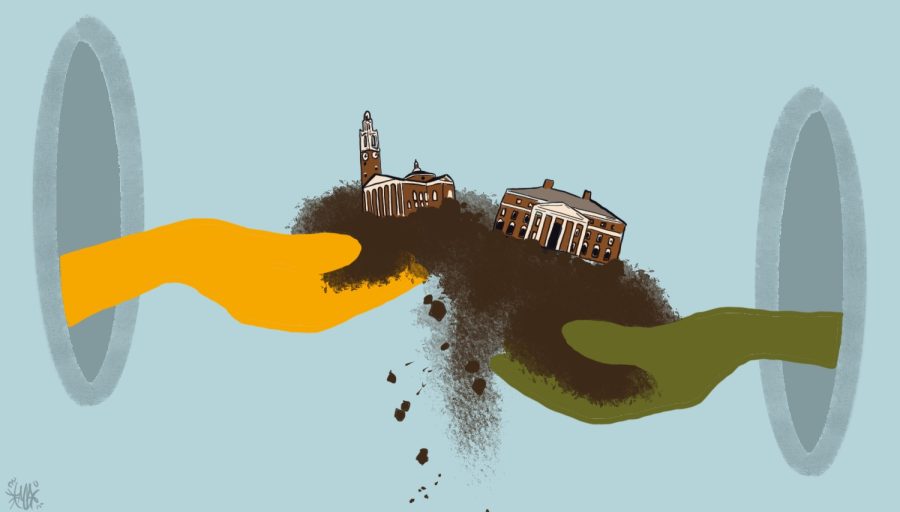Land acknowledgement isn’t enough
October 28, 2022
UVM has failed to ever truly recognize and atone for its role in the dispossession of Indigenous peoples.
The Abenaki tribe, in particular, are the Indigenous people of the N’kadinna, which includes the land we know as Vermont, New Hampshire, and parts of Maine, Massachusetts and Canada, according to the official website of the Abenaki Tribe.
The Abenaki people were targeted by the Vermont eugenics program, which the University was deeply complicit in. The majority of sterilizations occurred from 1931 to 1941, with the last noted sterilization taking place in 1957, according to UVM’s page about Vermont Eugenics.
In 2019, following the October 2018 removal of Guy W. Bailey’s name from what is now Howe Library, former University President Tom Sullivan released a statement apologizing for UVM’s historic involvement in and support of eugenics in Vermont.
Don Stevens, chief of the Nulhegan Band of the Coosuk-Abenaki Nation, praised Sullivan’s statement in a June 2019 Seven Days article.
However, in 2021, Stevens critiqued the name change, suggesting that the University should have kept the original name of the library building but made educational resources accessible about the history of Bailey’s role in the institution, according to a May 10, 2021 Cynic article.
UVM celebrated its first Indigenous Peoples’ Day in 2019 with widespread campus events, including a traditional Abenaki healing ceremony performed by Stevens and Roger Longtoe Sheehan, chief of the Elnu Abenaki tribe, as described in an October 2019 Cynic article.
In addition, they invited Indigenous keynote speaker Sarah Adams-Cornell, a citizen of the Choctaw Nation of Oklahoma and an outspoken activist for Indigenous and women’s rights, LGBTQ+ equality and environmental justice, according to the Center for Cultural Pluralism’s page on the first Indigenous Peoples’ Day.
In contrast, the observance for this year’s Indigenous Peoples’ Day was much smaller and understated, including just a one-hour panel and film discussion. Instead of continuing the steps towards partnership and collaboration with surrounding Indigenous communities, the University seems to be backpedaling towards apathy.
Two other important aspects to highlight about UVM’s interactions with Indigenous peoples are its status as a land-grant university as well as its association with Justin S. Morrill, the namesake of Morrill Hall, who wrote and proposed the Morrill Land Grant College Act of 1862.
UVM reaped the benefits from grants of stolen Indigenous land, which involved the dispossession of tribes in the West, according to a Sept. 23, 2021 Cynic article.
So, what should UVM do? Well, we can first take a lesson from another Vermont school.
Middlebury College, which released a land acknowledgement in 2021, included in their acknowledgement a section committing to actionable initiatives to promote education and positive engagement with Indigenous communities.
In praise of their land acknowledgement statement, Stevens told the Middlebury Campus about the failings of land acknowledgements that lack plans to give back or give Indigenous people the opportunity to use the land and resources that were originally theirs, according to a May 13, 2021 Middlebury Campus article.
Here are just some ways that UVM can begin to move forward:
- Formulate an official land acknowledgement in collaboration with local Indigenous communities and relevant student groups.
- Include a commitment to create partnerships with Indigenous peoples in order to repair the harm done to these communities and to share the resources UVM benefits from.
- Include practical actions and next steps the University will take to support Indigenous communities, such as voluntary land taxes, hiring programs and tuition waivers for prospective Indigenous students.
- Add a public and permanent acknowledgement outside of Howe Library regarding the history of the building and Guy W. Bailey’s support of the eugenics movement.
- Rethink the naming of Morrill in collaboration with representatives from local Indigenous communities and relevant student groups.
As students, we cannot directly change the University’s policies, but we can urge the administration to do better. Indigenous people deserve access to the resources and the land that rightfully belong to them.
